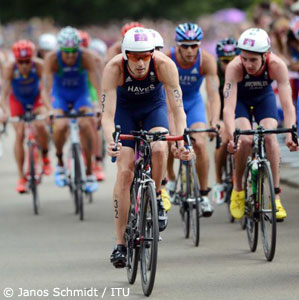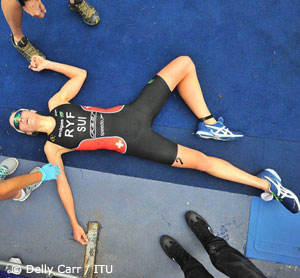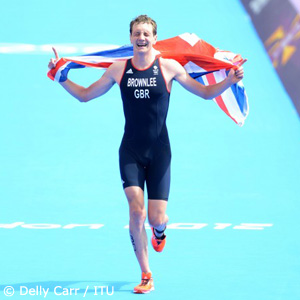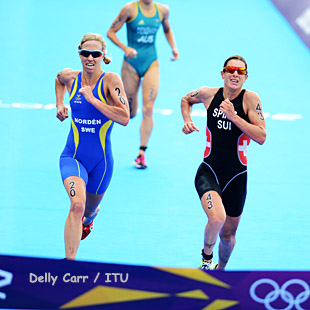To pick a domestique or not

With there being so much clamor about discretionary decisions in the weeks leading up to the Olympic Games it only seems fair to review performances now that it is all said and done. With the benefit of perfect hindsight we can hope to understand if the selectors were successful in their charge by selecting the most capable and useful triathletes.
Great Britain
Things quickly become muddled when delving into the intentions of British selectors. The GBR Congress states that triathlon is an individual sport. Furthermore Great Britain has refrained from using the term ‘domestique’ when describing the criteria for a discretionary selection. This left more than a few fans and athletes confused when Lucy Hall, far and away the top ITU swimmer, and Stuart Hayes, a reputation as a very strong cyclist, were chosen to compete over several higher ranked athletes.
As expected Lucy Hall led the swim and had a minute advantage over the main pack. And odd collection of strong swimmers did not get organized on the bike and were reeled in by the main group. This scenario played out to no advantage for favorite Helen Jenkins who was a minute behind Hall in the swim. While the British federation never defined the role of Lucy Hall, her presence did not appear to assist Helen Jenkins, nor was Hall ever considered to be a threat to finish in the top half of the field.
After being just slightly behind in a super fast swim Stuart Hayes worked himself up to the race lead with about 30 kilometers of biking remaining. From that point on he planted himself at the front of the group, kept the pace high, and only pulled off on a few rare occasions. The driving pace discouraged others from making breakaway attempts and kept the leaders away from the chasing pack. While need for Hayes to lead the bike can be argued and dissected from many angles, one cannot argue with the result. The Brownlees delivered gold and bronze medals to Great Britain.
Australia
There was much ado about Triathlon Australia’s selection process. The extremely rigorous automatic qualification process almost always results in a discretionary selection for each position. The Australian selectors had a wealth of female talent and although it was hard for them to make a ‘wrong’ choice, choosing the ‘most correct’ choice proved to be extremely difficult. In the end they went with 2008 Bronze medalist Emma Moffatt, Sydney WTS winner Erin Densham and young star Emma Jackson. This left 2008 Gold Medalist Emma Snowsill off the team and shocked many triathlon insiders. At the Olympics Densham would go on to win the bronze medal while Moffatt fell victim to an unforgivably slick corner. While Snowsill was careful never to attack the merits of her countrywomen, it was thought by the masses that Emma Jackson was the least qualified on the team. Jackson performed admirably at London finishing 8th. It is impossible to forecast where Snowsill would have finished had she competed.
The biggest name in triathlon made major news when Chris McCormack announced he would attempt to qualify for the 2012 Olympics and forgo defending his Kona Championship. While Australia usually has an excess of talent, the only obviously decision this Olympic cycle was the pre-selected Brad Kahlefeldt. While Macca had on several occasions been the top Australian finisher at major races, he never could track the top 15. In the end the selectors went with Courtney Atkinson and Brendan Sexton. Atkinson and Sexton would go on to finish 18th & 35th and Macca has happily returned to long distance racing.
Switzerland

While many of the nations included in this article had to make difficult decisions between well qualified athletes, Switzerland’s situation was unique. Their women’s squad has qualified just two entrants, not three. Nicola Spirig was the easy choice and the selectors had to decide between Melanie Annaheim and Daniela Ryf. In the past Ryf won the 2010 Seoul WTS but has recently struggled including 2 DNFs in the 2012 WTS. Annaheim on the other hand has been more consistent, including a dazzling 3rd at the 2011 Grand Finale. Plus, Annaheim had qualified Switzerland for an Olympic spot. Ryf was not ranked high enough and did not earn an entry for Switzerland in her name. In the end the Swiss federation awarded the 2nd entry to Ryf and she finished a disappointing 40th. But with Spirig taking the Gold, that did not really matter to the folks in Switzerland, except for Ryf and Annaheim of course.
France
Tony Moulai is the 36 year old veteran valiantly fighting off the twilight of his career. Vincent Luis is the future star that defeated Jonathan Brownlee at the 2008 Junior Championships. Problem for Luis is he has been injured in the early months of 2012 and Moulai is still routinely finishing in the top 20 at the most competitive races. Both were ranked high enough to earn a third French Olympic spot. With the future in mind the French selectors elected Luis. At just age 23 Vincent Luis went on to finish 11th at the Olympics.




Start the discussion at slowtwitch.northend.network